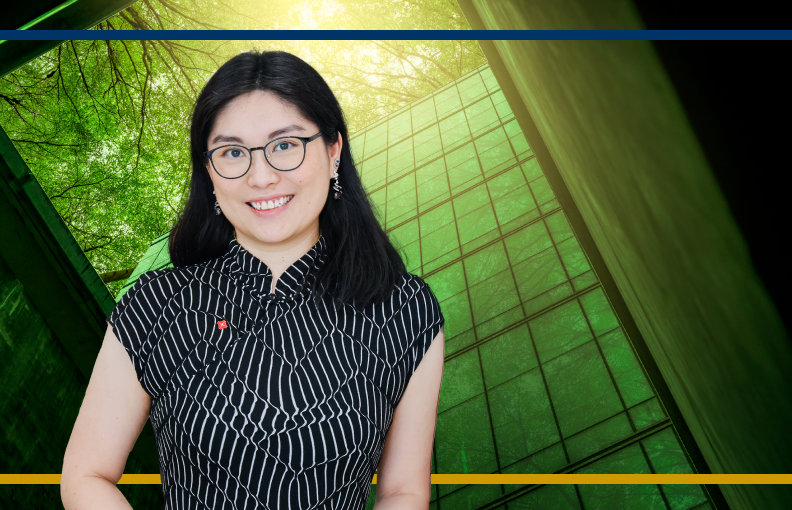From Finance Professional to Sustainability Leader

Preface – Serena MAK, a graduate of BBA in Global Business (2004) and Master of Science in Financial Analysis (2009), talks about her evolution as a sustainability leader and her pursuit of purpose and meaning.
Serena Mak has an exceptional talent for discussing sustainability. She talks about it with such depth and clarity that it reminds you of a brilliant educator who can make learning complex subjects sensationally engaging. “I’m also involved in education programs around sustainability,” she shares at her office in the heart of Hong Kong’s financial district.
Serena serves as the Executive Director of Sustainable Finance at DBS, spearheading sustainability initiatives on client engagement and transaction execution. Her role extends to advising on risk management and governance development and curating educational training to raise awareness among internal staff.
After work, Serena volunteers as an examiner for a European-certified ESG Analyst certification examination and as the Honorary Secretary of an environmental and sustainability charity in Hong Kong. Driven by her passion to pursue meaningful work, Serena’s journey so far is a testament to her willingness to drive impactful change.
Purposeful Pursuits
“Pursuing purposeful work aligned with my personal values are the driving forces of my life,” Serena shares. With over a decade of experience in finance, Serena began her career at Goldman Sachs, where she charted a remarkable career in Asia before making the pivotal transition to sustainable finance.
Even during her student years, Serena sought purpose while gaining professional skills. The Global Business (GBUS) curriculum significantly shaped her personal development journey, which required her to study various social science subjects alongside global business topics. This instilled in her a holistic worldview that has proven to be invaluable as she ventured into sustainability. “Sustainability isn’t a standalone topic,” she notes. “Having a broad perspective is essential to stay updated on global trends and developments.”
Undeniably, working in the dynamic realm of sustainability demands resilience and agility. Serena credits her ability to develop pragmatic solutions and embrace change to her experience working on projects and case studies with her accomplished classmates. “Studying with a ‘superstar cohort’ has given me a sense of flexibility in terms of what I can achieve,” she recalls fondly.
More Than Climate Change
Contributing to the community is ingrained in Serena’s character. During a study exchange program at New York University, she volunteered to teach children math at a community center in Chinatown. “I was probably the only exchange student that asked to volunteer,” she recalls.
Upon entering the professional world, Serena upheld her commitment to volunteering, participated in the diversity committee at Goldman Sachs and teaching financial inclusion to domestic helpers in Singapore. While acknowledging sustainability, especially climate change, has gained global recognition, Serena highlights that other aspects of sustainability like labor and community relations are equally vital.
In her current role, Serena sees the rise of sustainable finance as a powerful tool to direct capital towards impactful causes. As investors increasingly prioritize Environmental, Social, and Governance (ESG) factors, issues like greenwashing and data availability challenges dominate the conversation. "Better data disclosure and standardization are essential to understand these investment intricacies," she emphasizes.
It’s All in the Network
Serena’s evolution into sustainability is rooted in her network of like-minded individuals and mentors. Serena values mentorship as a two-way conversation, supporting her mentors and mentees while gaining fresh perspectives from their unique experiences. “I was introduced to the concept of mentorship at HKUST. It’s one of the most valuable aspects of my education.”
When asked how graduating students and professionals can transition into sustainability, Serena mentions various educational programs, government subsidies and volunteering opportunities with non-profit organizations as valuable resources to gain essential knowledge. “Whichever field you’re in, explore what resonates with you and get your hands dirty to learn more about it,” she advises. “If you have further questions, don’t be shy. Just ask.”






